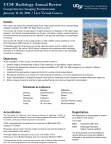UCSF Radiology Annual Review - Virtual Live

Course Format
Five full-day sessions Monday thru Friday, schedule-at-a-glance below, covering each of the Subspecialties in half-day sessions.
Course speakers will include 40+ UCSF Radiology Faculty.
Digital syllabus and log-in instructions will be emailed the week prior to the course.
This course will be available for post-live online review for 30 days following; you must attend (log-in) to the daily live broadcast sessions for access.
Course Outline and Objectives
This course will review the fundamentals of the major organ systems and corresponding imaging modalities (CT/ MR/ US/ DSA/ Fluoro/ X-rays). The course will consist of case-based, in-depth sessions on diseases of the major organ systems; and shorter focused lectures on physics, rad safety, cardiac, nuclear medicine and interventional procedures that are relevant to the general radiologist and radiologist-in-training.
The course will include an hour-long session of 100 multiple-choice questions on the Non-Interpretive Skills relevant to radiology trainees. To facilitate learning, all lectures will include rapid-fire cases and/or multiple choice questions (MCQ), as well as “MCQ Galore” sessions that emphasize basic radiology principles in a fast-paced, question format that will be of clinical value to the radiologist on-call and in-training.
At the completion of the course, the attendee will be able to:
1. Identify imaging fundamentals of each of the radiology sub-specialties (organ systems);
2. Prescribe the appropriate utilization of imaging modalities (CT, MR, US, Mammography, Nuc Med) for different medical conditions;
3. Implement the appropriate imaging protocols for routine clinical presentations;
4. Recognize indications and markers for interventional procedures, as well as assessment of outcomes;
5. Apply classifications of pathophysiological mechanisms underlying human disease to facilitate differential diagnosis;
6. Refine imaging criteria to optimize image quality/findings and improve diagnostic interpretation.
Schedule at-a-Glance
All times are listed in Pacific Standard Time
Mid-session break 11:00-12:00 Mon-Thursday, 11:30-12:00 on Friday
Day Time AM PM
Jan 11, Mon 8:00 am - 5:00 pm Gastrointestinal Genitourinary
Jan 12, Tues 7:30 am - 5:15 pm Thoracic Breast
Jan 13, Wed 8:00 am - 5:00 pm Peds / NeuroVasc Neuro
Jan 14, Thur 8:00 am - 4:45 pm Ultrasound Cardiac/ Physics/ Safety
Jan 15, Fri 7:30 am - 3:45 pm IR / Nuc Med Musculoskeletal

